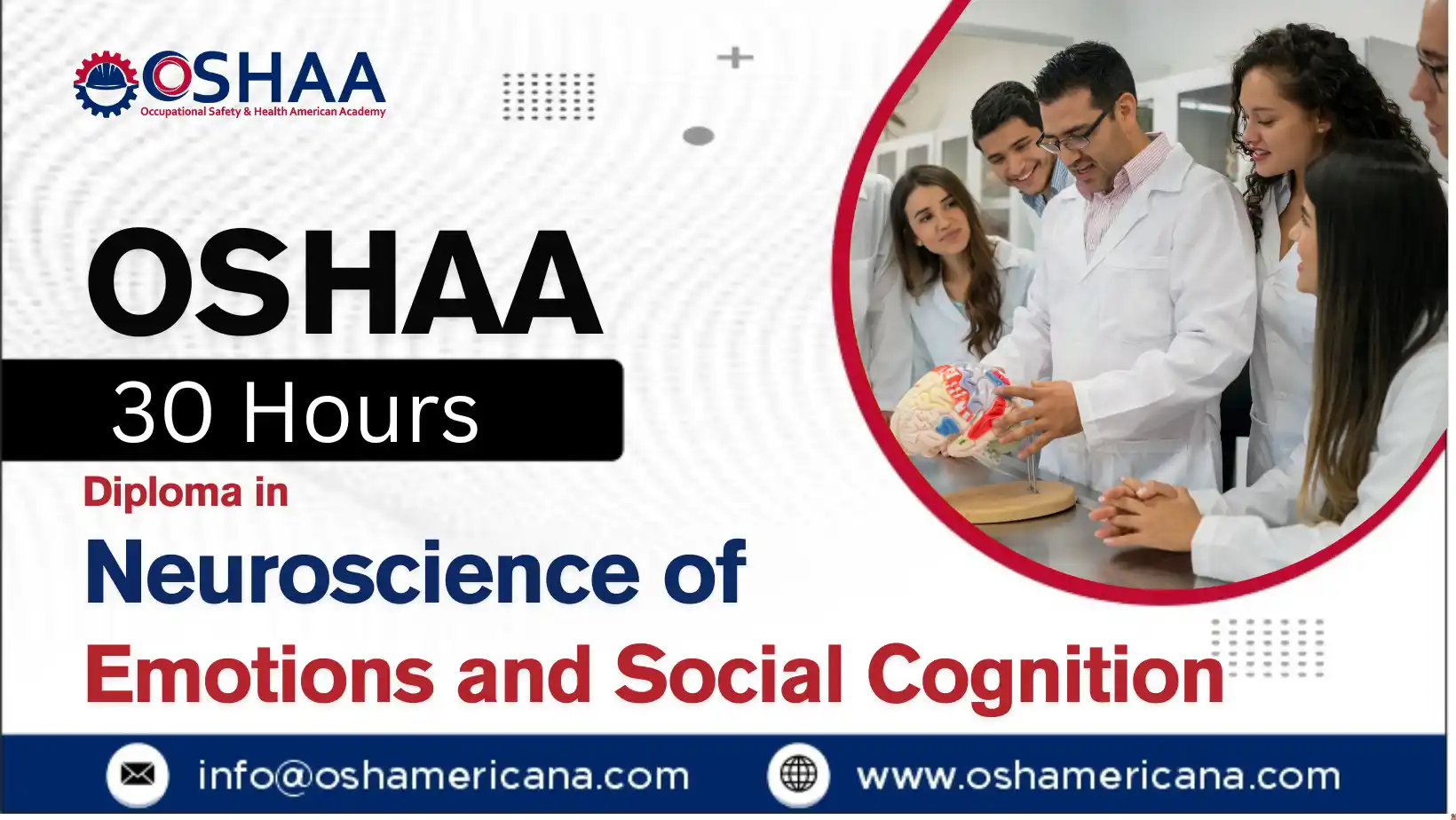Unlock the Science of Emotions: Diploma in Neuroscience of Social Cognition
The OSHAA 30-Hours Diploma in Neuroscience of Emotions and Social Cognition offers a comprehensive exploration of how the human brain perceives, processes, and responds to emotional and social stimuli. This professionally structured course is designed to provide participants with a deep understanding of the neural foundations of affective experiences and interpersonal behaviour, equipping them with skills applicable across psychology, education, healthcare, and research sectors.
Understanding how emotions influence behaviour, decision-making, and social interactions is essential in many professional contexts. This diploma blends cutting-edge neuroscience with practical application, helping participants enhance their insight into human emotions and cognitive social functioning.
This course introduces participants to the key concepts of affective neuroscience and social cognition, covering how the brain supports emotional regulation, empathy, moral reasoning, and social judgement. Through a detailed study of neural circuits, brain regions, and psychological models, participants will examine how emotions and social processes develop and influence behaviour in real-life contexts.
Designed to UK professional standards, the diploma delivers content in a structured and accessible format, offering 30 hours of guided learning. It is ideal for those seeking to advance their knowledge in human neuroscience and its relevance to mental health, interpersonal dynamics, and behaviour.
The OSHAA Diploma in Neuroscience of Emotions and Social Cognition is designed to bridge neuroscience theory with practical understanding. It offers an engaging and insightful learning experience for participants aiming to apply emotional and social neuroscience to real-world challenges.
OSHAA 30-Hours Diploma in Neuroscience of Emotions and Social Cognition
Study Units
Learning Outcomes
Introduction to Affective Neuroscience and Emotional Processing (3 hours)
- Understand the basic principles of affective neuroscience and its role in psychology
- Identify key theories and models related to emotional processing in the brain
- Recognise how emotions influence behaviour and decision-making
Brain Structures Involved in Emotion Regulation (4 hours)
- Identify major brain regions such as the amygdala, prefrontal cortex, and insula involved in emotion regulation
- Understand how these structures interact during emotional arousal and regulation
- Analyse how dysfunction in these areas can contribute to emotional disorders
Neurobiology of Empathy, Compassion, and Moral Cognition (5 hours)
- Explore the neural mechanisms underlying empathy, moral judgement, and prosocial behaviour
- Understand the role of mirror neurons and related circuits in emotional resonance
- Evaluate how individual differences in neurobiology affect moral reasoning and social behaviour
Social Cognition: Theory of Mind and Perspective-Taking (4 hours)
- Define theory of mind and its significance in understanding others’ mental states
- Examine neural substrates supporting perspective-taking and social reasoning
- Apply this understanding to interpret social interactions and communication challenges
Emotional Learning and Decision-Making Mechanisms (3 hours)
- Understand how emotional experiences influence learning and decision-making processes
- Identify brain systems involved in risk, reward, and emotional memory
- Examine how emotional biases impact judgement and behaviour
Neuroscience of Attachment and Social Bonding (5 hours)
- Explore the neurobiological basis of attachment behaviours and social bonding
- Understand the roles of oxytocin, dopamine, and other neurotransmitters in forming relationships
- Assess how attachment styles are shaped by early life experiences and neural development
Understanding Emotional Dysregulation and Psychopathology (4 hours)
- Define emotional dysregulation and its relevance in various psychological conditions
- Identify neural correlates associated with anxiety, depression, and mood disorders
- Apply neuroscientific insights to better understand symptoms and treatment responses
Cultural and Developmental Influences on Social Cognition (2 hours)
- Understand how culture and upbringing influence emotional expression and social cognition
- Examine developmental milestones in emotional and social brain function
- Evaluate the impact of early environmental factors on empathy and social learning
Course Benefits – OSHAA 30-Hours Diploma in Neuroscience of Emotions and Social Cognition
- Gain a comprehensive understanding of the brain mechanisms behind emotion, empathy, and social interaction
- Develop insights into how emotional and social processes influence human behaviour and mental health
- Build foundational knowledge in affective neuroscience relevant to psychology, education, and healthcare sectors
- Learn to interpret emotional dysregulation and social impairments through a neuroscientific lens
- Explore how brain structures such as the amygdala and prefrontal cortex contribute to emotional regulation
- Improve ability to apply theory of mind and social cognition in real-world settings
- Enhance professional skills for working with individuals experiencing emotional or relational challenges
- Strengthen academic and clinical readiness for advanced training or research in neuroscience and psychology
- Achieve a professionally recognised qualification aligned with UK academic and CPD standards
- Open doors to diverse roles in mental health, behavioural support, educational psychology, and social care
- Participants with a background in psychology, neuroscience, counselling, or behavioural sciences
- Professionals working in mental health, education, healthcare, or social services seeking to enhance their understanding of emotional and social functioning
- Individuals interested in the neural basis of emotion, empathy, and social behaviour
- Participants preparing for further academic study or clinical training in affective or cognitive neuroscience
- Those aiming to improve their ability to interpret and respond to emotional and interpersonal dynamics in professional settings
- Professionals involved in therapy, behavioural support, or developmental care looking to deepen their theoretical and practical knowledge of the brain’s role in emotional processing







